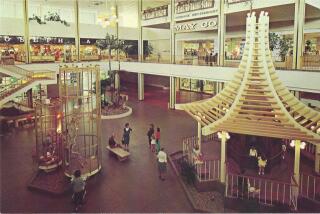It’s Not Just a Shopping Trip, It’s an Adventure for Bored Kuwaitis
- Share via
KUWAIT CITY — At the Souk Sharq, all roads meet at the top of the escalator. And by 9 p.m. on a weekend night, the traffic inside Kuwait’s premier mall is jammed.
The regular crowd of shoppers, loiterers and wanderers has become a swirling mass of humanity. Teenage boys with stringy mustaches keep watch on the girls out of the corners of their eyes. Lines lengthen at Burger King, where mothers draped in black feed French fries to their children. Immigrant janitors dodge everyone else as they try to sweep up cigarette butts and trash. When a cell phone rings, and they always seem to be ringing here, a dozen or more people pat their pockets.
Things aren’t much different in the parking lot, where Fords and Chevys battle for spots with herds of Mercedes and BMWs.
Another Iraq war looms and the emir is ailing. But this is Kuwait, and the weekend is here. So at the souk -- the Arabic word for market -- there’s just one thing to do.
“I CAN’T STOP THINKING ABOUT SHOPPING,” blares a poster for a clothing store in foot-tall pink letters, just outside the exit to the mall. That pretty well sums things up.
“We’re here all the time,” said Zeyad al Owaish, 19, who was at the mall on a recent weekend night. “This is what we do.”
They do it with a fervency that borders on the religious. Shopping is popular the world over, and cruising malls is a skill that American teenagers have been honing for more than a generation. But in Kuwait, a conservative Muslim country, heading to the mall has become about much more than shopping.
Kuwait has no bars, no discos and little for young people to do with their free time. Alcohol is banned and dancing so restricted it might as well be. It’s a country where hashish can be easier to find than black market Budweiser, and where money and boredom are helping fuel an increasing drug problem. Over long weekends, it’s almost impossible to get flights to the more easy-living Gulf states, like Dubai or Bahrain.
So they shop.
“There’s nothing else to do here,” grumbled Mohammed Kajal, a Lebanese worker who has spent 20 years in Kuwait -- but only because he can earn a better living here than he would in Beirut. “In Dubai, you can have fun. But here: nothing!”
Certainly, Kuwaitis can afford to shop, even with the steep prices at the Souk Sharq.
This New Jersey-sized Gulf state sits atop 10% of the planet’s proven oil reserves, giving it the world’s sixth-largest gross domestic product per capita. They spend a lot of it at the Souk Sharq. It’s not Kuwait’s most exclusive mall -- that would be the Salhia Complex, with its Cartier, Chanel and other hyper-expensive boutiques -- but on a weekend night, the souk becomes the country’s most popular destination.
The mall, which sprawls out over many acres, is a monument to oil-money consumerism and American-dominated globalization. Men in flowing tunics and many women covered in black show that this is the Arab world, but little else does.
There’s Starbucks and Haagen-Dazs and Whopper Value Meals at Burger King for 1.25 Kuwaiti dinars -- about $3.75. Tommy Hilfiger T-shirts are $39.
It’s not a quiet consumerism on display here. Instead, it’s tight spangly cardigan sweaters for $66 and green giraffe-leather Italian shoes for $375. It’s Swiss watches and diamond necklaces that cost more than many in Kuwait’s vast army of foreign workers earn in a year. Nearly two-thirds of the 2.3 million residents come from abroad to fill low-status jobs.
For many of its patrons, the souk is barely about shopping at all.
Al Owaish, the 19-year-old, says the prime attraction is one young people find in malls everywhere: seeking the opposite sex.
“You have to do it secretly,” al Owaish said, waving his hand discreetly to show how he motions girls to come over to talk.
“If her brother sees you, it’s a big problem. He might want to beat you up,” said al Owaish, who was photographing a friend outside the mall on a recent evening, using his new $600 mobile phone-camera. “With Arabs, this is a big problem.”
For some Kuwaitis, the real problem reaches much deeper. For some, the rampant consumerism bred by oil wealth has irrevocably changed a nation that is, at its core, deeply conservative.
“We’ve made steps forward financially, but as far as our social fabric goes, we’ve moved backward,” said Waleed al Tabtabai, a conservative lawmaker. He believes that Kuwait’s wealth has made it lazy, by allowing its citizens to contract out to foreign workers an immense amount of work -- from street sweeping to newspaper reporting -- leaving a lot of time for shopping.
“Materialism has overpowered our values and morals,” Tabtabai said.
That may be. But it’s also lawmakers like al Tabtabai who have tried to make sure that alternatives to shopping, from bars to nightclubs, are banned.
“People have to do something,” Kajal said. “So they come to the mall.”
More to Read
Sign up for Essential California
The most important California stories and recommendations in your inbox every morning.
You may occasionally receive promotional content from the Los Angeles Times.













